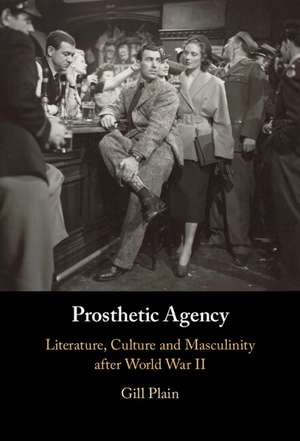Prosthetic Agency: Literature, Culture and Masculinity after World War II
Autor Gill Plainen Limba Engleză Hardback – 12 iul 2023
Preț: 593.40 lei
Preț vechi: 652.08 lei
-9% Nou
Puncte Express: 890
Preț estimativ în valută:
113.55€ • 118.85$ • 94.51£
113.55€ • 118.85$ • 94.51£
Carte tipărită la comandă
Livrare economică 31 martie-14 aprilie
Preluare comenzi: 021 569.72.76
Specificații
ISBN-13: 9781316513200
ISBN-10: 1316513203
Pagini: 300
Dimensiuni: 236 x 159 x 27 mm
Greutate: 0.59 kg
Editura: Cambridge University Press
Colecția Cambridge University Press
Locul publicării:New York, United States
ISBN-10: 1316513203
Pagini: 300
Dimensiuni: 236 x 159 x 27 mm
Greutate: 0.59 kg
Editura: Cambridge University Press
Colecția Cambridge University Press
Locul publicării:New York, United States
Cuprins
Introduction; Part I. Technology: 1. Enabling machines: Hammond Innes, Nevil Shute and technologies of rehabilitation; 2. Cinema in the sky: risk, responsibility and domestic citizenship; 3. Bad science: Nigel Balchin and the limits of technological man-making; Part II. Disability: 4. Writing rehabilitation: prosthetic autobiography and self-(re)invention; 5. Unrepresentable wounds? Nevil Shute, Hammond Innes and the legacies of damage; 6. A 'machine genius of the new aerial art': imagining Douglas Bader; Coda: of pigs and men.
Recenzii
Prosthetic Agency bursts with insight. To call this book a tour de force would be to understate its accomplishment. From the smallest detail to the largest structural organization, the argument about the prosthetic nature of masculinity after the Second World War is handled with magisterial perceptiveness. Gill Plain dextrously weaves together examples from literature and film, and her analysis is all the more valuable for its comprehensive engagement with both media in the 1940s and 1950s. Prosthetic Agency sets a new standard for writing about war, recovery, and masculinity in British studies. Allan Hepburn, McGill University
Notă biografică
Descriere
This book addresses the legacy of World War II on male identity and reinvention.
